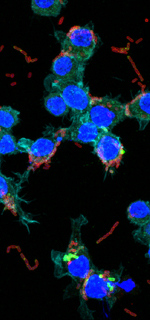 The Penn Vet Center for Host-Microbial Interactions (CHMI) formed in 2013 as an interdisciplinary center that helps faculty leverage cutting-edge genomic approaches to understand how microbes (viruses, bacteria and parasites) influence animal health and disease. These so-called ‘host-microbial interactions’ represent an ongoing evolutionary arms-race between mammals and the microbial world we live in.
The Penn Vet Center for Host-Microbial Interactions (CHMI) formed in 2013 as an interdisciplinary center that helps faculty leverage cutting-edge genomic approaches to understand how microbes (viruses, bacteria and parasites) influence animal health and disease. These so-called ‘host-microbial interactions’ represent an ongoing evolutionary arms-race between mammals and the microbial world we live in.
Most people are familiar with well-known viral infections caused by influenza, ebola; or bacterial infections caused by Salmonella or E. coli. In each case, these pathogens can spread from animals to people, highlighting the notion that humans, animals, and our environment are inextricably connected by infectious diseases — a concept termed ‘One-Health’.
In the past few years it has become increasingly clear that just as there are microbes that cause disease, there are also beneficial microbes that are crucial in maintaining health. Beneficial bacteria colonize our gut, skin and urogenital tract at birth and these complex microbial communities - termed a microbiome - develop just as our organ systems develop.
Researchers at Penn Vet, with assistance from CHMI, are actively studying the role of these the microbiome in animal diseases ranging from atopic dermatitis, inflammatory bowel disease, to mental health.
Our mission is to better understand and treat disease through the study of microbes and the diverse ways animals respond to viruses, bacteria and parasites.
Our Goals:
- Establish an internationally recognized center that is the first of its kind at veterinary schools
- Engage the broader Penn Vet community in host-microbial research that leverages ‘omic approaches
- Develop stronger ties across schools at UPenn
- Leverage spontaneous animal models of disease commonly seen at the Penn Vet Ryan Hospital
- Establish a convenient ‘in-house’ solution for Penn Vet labs to analyze complex data sets that result from systematic studies of gene expression, microbial whole-genome sequencing, and the composition of microbial communities living on animals.
Read More About The Center for Host-Microbial Interactions